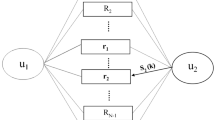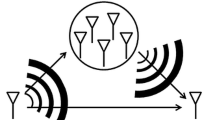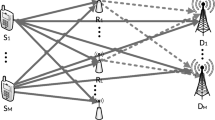Abstract
Space–time network coding has recently been used in cooperative communication to mitigate the problem of transmission delay in wireless systems as well as handle the issue of imperfect synchronization. However, using all relays for transmission to forward the network coded signals can still cause delay in such networks, resulting in lower throughput. In this paper, we propose a Q-learning based relay selection algorithm (QL-RSA) that maximizes the total capacity of the network by learning the cooperative network environment. QL-RSA is distributed, as each source is capable of self-learning in order to select the optimal relays separately, without exchanging information with the other source nodes. Similarly, the proposed algorithm is adaptive as it can efficiently learn the network under varying channel conditions to select the relays. We choose different sets of relays and study the impact of relay selection on the performance in terms of the throughput and outage using QL-RSA.






Similar content being viewed by others
References
Alamouti, S. M. (1998). A simple transmit diversity technique for wireless communications. IEEE Journal on Selected Areas in Communications, 16(8), 1451–1458.
Liu, K. J. R., Sadek, A. K., Su, W., & Kwasinski, A. (2008). Cooperative communications and networking. Cambridge: Cambridge University Press.
Sadek, A. K., Su, W., & Liu, K. J. R. (2007). Multinode cooperative communication in wireless networks. IEEE Transactions on Signal Processing, 55(1), 341–355.
Su, W., Sadek, A. K., & Liu, K. J. (2008). Cooperative communication protocols in wireless networks: performance analysis and optimum power allocation. Wireless Personal Communications, 44(2), 181–217.
Laneman, J. N., Tse, D. N., & Wornell, G. W. (2004). Cooperative diversity wireless networks: Efficient protocols and outage behavior. IEEE Transactions on Information Theory, 50(12), 3062–3080.
Lai, H. Q., & Liu, K. J. R. (2011). Space–time network coding. IEEE Transactions on Signal Processing, 59(4), 1706–1718.
Zhang, S., Liew, C., & Lam, P. (2006). Physical layer network coding. In Proceedings of the international conference on mobile computing and networking (MobiCom) (pp. 358–365). Los Angeles, CA, USA.
Baidas, M. W., Lai, H.-Q., & Liu, K. J. R. (2010). Many-to-many communications via space–time network coding. Proceedings of IEEE wireless communications and networking conference (WCNC), (pp. 1–6). Sydney, Australia.
Xiong, K., Fan, P., Yang, H.-C., & Letaief, K. B. (2014). Space–time network coding with overhearing relays. IEEE Transactions on Wireless Communications, 13(7), 3567–3582.
Xiong, K., Li, T., Fan, P., Zhong, Z., & Letaief, K. B. (2013). Outage probability of space–time network coding with amplify-and-forward relays. Proceedings of IEEE Global communications conference (GLOBECOM) (pp. 3571–3576). Atlanta, GA, USA.
Baidas, M. W., & MacKenzie, A. B. (2014). Many-to-many space–time network coding for amplify-and-forward cooperative networks: node selection and performance analysis. EURASIP Journal on Wireless Communications and Networking. https://doi.org/10.1186/1687-1499-2014-48.
Ibrahim, A. S., Sadek, A. K., Su, W., & Liu, K. J. R. (2008). Relay selection in multi-node cooperative communications: When to cooperate and whom to cooperate with? IEEE Transactions on Wireless Communications, 7(7), 2814–2827.
Zhao, Y., Adve, R., & Lim, T. J. (2007). Improving amplify-and-forward relay networks: Optimal power allocation versus selection. IEEE Transactions on Wireless Communications, 6(8), 3114–3122.
Sutton, R. S., & Barto, A. G. (1998). Reinforcement learning. Cambridge, MA: MIT Press.
Thilina, K. M., Choi, K. W., Saquib, N., & Hossain, E. (2013). Machine learning techniques for cooperative spectrum sensing in cognitive radio networks. IEEE Journal on Selected Areas in Communications, 31(11), 2209–2221.
Semov, P., Al-Shatri, H., Tonchev, K., et al. (2017). Implementation of machine learning for autonomic capabilities in self-organizing heterogeneous networks. Wireless Personal Communications, 92(1), 149–168.
Baidas, M. W. (2014). Cooperation in wireless networks: A game-theoretic framework with reinforcement learning. IET Communications, 8(5), 740–753.
Jadoon, M. A., & Kim, S. (2017). Relay selection algorithm for wireless cooperative networks: A learning-based approach. IET Communications, 11(7), 1061–1066.
Saha, A. Ghosh, A., & Hamouda, W. (2014). Learning based relay selection for cooperative networks. In Proceedings of IEEE global commununcation on conference (GLOBECOM) (pp. 386–391). Austin, TX, USA.
Acknowledgements
This research was supported by the Research Program through the National Research Foundation of Korea (NRF-2016R1D1A1B03934653, NRF-2019R1A2C1005920).
Author information
Authors and Affiliations
Corresponding author
Additional information
Publisher’s Note
Springer Nature remains neutral with regard to jurisdictional claims in published maps and institutional affiliations.
Rights and permissions
About this article
Cite this article
Jadoon, M.A., Kim, S. Learning-Based Relay Selection for Cooperative Networks with Space–Time Network Coding. Wireless Pers Commun 108, 907–920 (2019). https://doi.org/10.1007/s11277-019-06439-2
Published:
Issue Date:
DOI: https://doi.org/10.1007/s11277-019-06439-2




